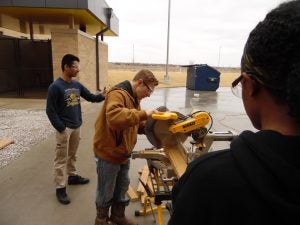Joanna Farmer grew up immersed in 4-H and FFA in rural Texas. She raised registered Southdown sheep. But when Farmer was tasked with starting an agricultural education program in urban Wichita, Kansas last year, the first-year ag teacher found she couldn’t solely rely on her strong agriculture background. She needed to keep on open mind.
“I love it when people ask me ‘why’ and ‘how’ are we teaching urban kids about agriculture,” Farmer said. “It opens up the door for my ‘it’s more than plows, cows, and sows’ speech.”
The Wichita district is home to 51,000 kids, with Wichita Southeast High School housing approximately 2,000 students. Over 80 percent of the population receives free and reduced lunches. Her first year teaching ag education, Farmer had 70 kids enroll in her classes. Out of that 70, only one student had a connection to agriculture — grandparents that owned a farm in a different state.
“Our school is very urban and it has not had the best reputation. Over the years, it has been known for fighting and a high drop-out rate,” Farmer said. “The current group of students are wanting to change the community’s perception of our school.”
That’s part of the reason why Wichita Southeast started building a community garden.
“As a group, community service kept coming up as their main focus. They started brainstorming and came up with an idea for the community garden,” Farmer said. “It seemed like the total package of agriculture and community service.”
Farmer then introduced the students to grant writing and the students started filling out paperwork after school. About two months into the school year, the students were awarded a grant for $1,000.
“They were hooked. The grant writing continued and the money kept flowing,” Farmer said. “Every time the account balance went up, the bigger the garden design became.”
Not only did the money keep pouring in, so did the students.

“When we started building our garden beds, more and more students asked to help,” Farmer said. “We started working on Saturdays so that every student had a chance to participate.”
Over the summer, the school had a rotating group of 40 students who tended to the garden. The garden also helped supply all of their families’ fresh food over the summer months.
This year Farmer has over 150 students enrolled in her classes and is almost at full capacity. The FFA chapter is in place and more than 40 members have paid their dues.

“I was somewhat surprised about how fast our program has grown – I knew there was a lot of interest because of the projects that were happening, but the huge growth surprised everyone,” Farmer said.
The students have continued grant writing and plan to double the garden in size and add an outdoor classroom as well as a koi pond. Farmer said the students hope that by having these spaces on campus, it will provide a place for students to get away from the shoulder-to-shoulder traffic in the hallways and the loud cafeterias.
“Our community is still learning what FFA is about and hopefully as they see the things we are doing they will become supporters of our program,” Farmer said.
For other FFA chapters wanting to start a garden, Farmer says student buy-in is key.
“This was their idea, they wrote the grants, built the beds, and planted the seeds,” Farmer said. “They want it to be successful.”



